[Archives] [Deadfile] [Deadnet]
animation sequence of "The Grateful Dead Movie."
Dear Deadheads,
Here's the rundown on everything completed or sufficiently near completion to announce. This is the biggest batch of stuff we've ever got together, the fruits of incessant activity known as The Vacation. It includes four record albums, a feature length movie and a decision that vacationing is too exhausting too continue, meaning the Grateful Dead has decided to get back into touring.
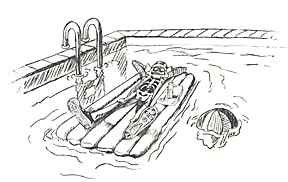
Intensive rehearsals begin this week to get the performing edge back on the band and to outfit it with new material. Rehearsals and then recording and then back on the road. The date is not yet agreed upon, or the place, but it will be somewhere around the middle of '76. Announcements will be made prior to the gigs. The hit and run method. In the words of Phil Lesh, "We're all horny to play. '' If you're as hot to hear us as we are to do it, we can get the mother rollin' one more time, for sure.
So, here's what we have for you in the meantime.
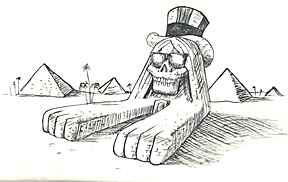
Garcia's new album "REFLECTIONS" is ready to go out and should be available to you before the end of January. Rather than giving you a view of it, here is a list of the tunes and personnel which will give a more exact idea of what to expect.
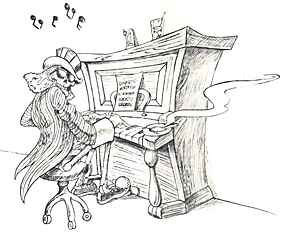
REFLECTIONS - JERRY GARCIA - RX 107
(Side I)
MIGHT AS WELL (3:52) - Robert Hunter / Jerry Garcia
Jerry Garcia Lead Guitar, Organ & Vocal Bob Weir Second Guitar & Background Vocal Phil Lesh Bass Bill Kreutzmann Drums Keith Godchaux Fender Rhodes & Tack Piano Donna Jean Godchaux Background Vocal Mickey Hart Drums & Percussion MISSION IN THE RAIN (4:48) - Robert Hunter / Jerry Garcia
Jerry Garcia Lead Guitar, Acoustic Guitar, Chimes & Vocal Nicky Hopkins Piano John Kahn Bass, Synthesizer & Vibes Ron Tutt Drums Larry Knechtel Fender Rhodes THEY LOVE EACH OTHER (4:32) - Robert Hunter / Jerry Garcia
Jerry Garcia Lead Guitar, Percussion & Vocal Bob Weir Second Guitar Phil Lesh Bass Bill Kreutzmann Drums Keith Godchaux Fender Rhodes Mickey Hart Drums & Percussion John Kahn Organ I'LL TAKE A MELODY (9:22) - Allen Toussaint
Jerry Garcia Lead Guitar, Synthesizer, Percussion & Vocal Donna Jean & Bob Background Vocals John Kahn Bass, Organ & Synthesizer Ron Tutt Drums Nicky Hopkins Piano Larry Knechtel Fender Rhodes Mickey Hart Percussion & Fire Extinguisher (Side II)
1T MUSTHAVE BEEN THE ROSES (5.23) - Robert Hunter
Jerry Garcia Lead Guitar, Rhythm Guitar & Vocal Bob Weir Second Guitar & Harmony Vocal Phil Lesh Bass Bill Kreutzmann Drums Keith Godchaux Acoustic Piano & Fender Rhodes Donna Jean Godchaux Harmony Vocal Mickey Hart Drums & Percussion TORE UP OVER YOU (4:27) - Hank Ballard
Jerry Garcia Lead Guitar & Vocal Nicky Hopkins Piano John Kahn Bass Ron Tutt Drums Larry Knechtel Piano Mickey Hart Percussion CATFISH JOHN (6:47) - Bob MMcDill / Allen Reynolds
Jerry Garcia Lead Guitar & Acoustic Guitar, Snythesizer &Vocal Donna Jean & Bob Harmony Vocals Nicky Hopkins Piano John Kahn Bass, Clavinet & Synthesizer Ron Tutt Drums Mickey Hart Percussion COMES A TIME (6:19) - Robert Hunter / Jerry Garcia
Jerry Garcia Lead Guitar, Rhythm Guitar, Bells & Vocal Bob Weir Second Guitar Phil Lesh Bass Bill Kreutzmann Drums Keith Godchaux Fender Rhodes Mickey Hart Drums, Percussion & Box
"EAT YOUR TICKET?"
About a year ago, the Dead decided rather spontaneously to organize a large crew of film technicians and commit 5 consecutive concerts at Winterland, San Francisco to posterity and celluloid. The result was a quarter of a million feet of film and music shot by 8 cameramen and recorded on 16 tracks by the Dead crew. Since that time, Garcia, the band, myself, Susan Crutcher, John, Lisa, Murray, Emily and Eddie, et. al. have concerned ourselves with syncing up, organizing, understanding and finally editing this mountain of movie. The film at this point is still rough and very long; but it's close to completion. It reflects the entire scene surrounding the Dead Family: the energy of their music on stage, raps with old time Dead freaks, the crew setting up, technological flashes and the environmental texture of those 5 days and nights. Combined with the live action shooting there are animation and slide sequences; an accumulation of 10 years of visual paraphenalia. It should get you off whether you were at the live Winterland shows or not. We hope so!
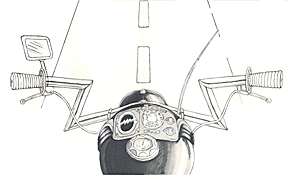
Picture yourself walking up a dark alley on a cool night in December of '75, a bottle of tokay in your hand and a wallet full of second party checks which no one will cash, when out of the shadows slips a punk with a shiv, then another and another and suddenly you find yourself surrounded and about ready to do whatever you're told, when a fifth character appears upon the scene and says "All right you guys, fun is fun, but we have a gig at. . . . in ten minutes. Sorry about my boys, pal, but they require a certain intensity of experience in their day to day existence. Here, take these tickets and come to the show. No hard feelings?" You've just met Bob Weir. You gratefully accept the billets and they take off in the night. You look at the tickets in your hand: "KINGFISH."
You make it to the show, and you hardly recognize the same hoodlums who an hour ago held a knife to your throat. They are somehow transfigured into apparently angelic musicians and only you, among this audience of teeming, veering fans know the real truth about them.
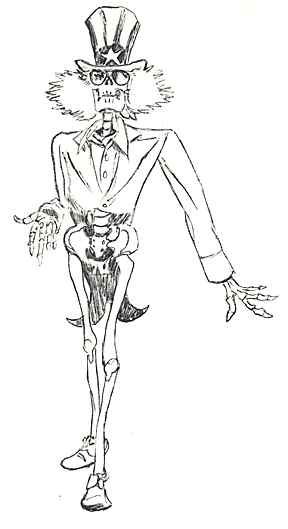
And now they have a record, due to come out in mid-February. You couldn't make out much of what they were playing at the gig, over the raging of the crowd, and you're kind of curious. 0K, stay curious, because its a curious record.
The first punk who accosted you, you now recognize as Dave Torbert, the same guy who used to do all those New Rider albums, He's doing a handful of his own tunes on this album and Weir and his collaborator John Barlow have a couple more you haven't heard yet.
Matt Kelly, champion peninsula harmonica cat, sings and plays his guitar in a unique way behind the elaborate lead guitar phrasings of his long time playing and drinking partner, Robbie Hoddinott.
Chris Harold, late of Shango and the old New Delhi River Band (with David Nelson and Dave Torbert) rounds out the rhythm section in a straight ahead rock manner.
Those of you who have followed the development of Kingfish in their extensive gigging will find some of their unique flavor in this album, without the crowd sounds.
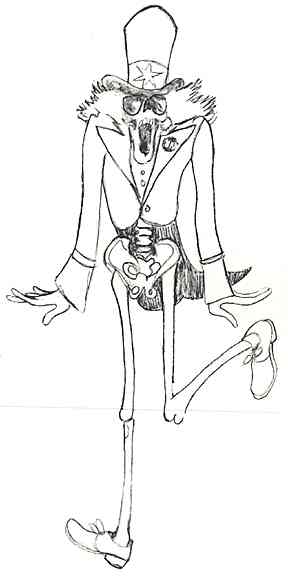
SNAPSHOT:
Billy Kreutzmann in frenetic red trousers busts his ass keeping everybody in time, Mike Larschied plays bass and Steve Schuster provides the odd sax, flute and timbali line. Keith is seemingly asleep at the keyboard, only his fingers present in the concert hall, wired by radio to his mind which floats high over Winterland on Donna's wail.
Keith & Donna Band are planning to go into the studio in March to record the tunes they're busy writing. They're back from touring the East Coast, ending with a December gig at Winterland in company with Garcia's Band and Kingfish. The three bands traded off members partway through Keith and Donna's Saturday set forming one of the famous impromptu groups audiences are beginning to expect when the bands come together for an evening.
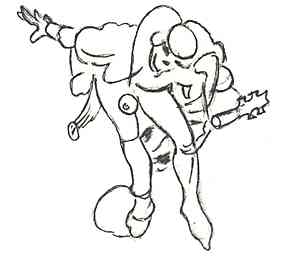
GOOD OLD BOYS
When Anton Round asked me to write a few words about the "Pistol Packin' Mama" album, I tried to think of what to say and couldn't even come close to what a fantastic trip it was, doing that session. In two days we had 25 songs down on tape, and upon listening back, some of the tastiest, most fun, and liveliest bluegrass ever recorded! I felt like a kid with dreams of the big leagues who was approached by Mantle, DiMaggio, and Ruth and told "well sure we'll play with you, and all your friends too!"
These three guys wrote the book on banjo, mandolin and fiddle. Chubby Wise is the dearly loved daddy of the country fiddle. He played on the sessions which are today regarded as the definitive bluegrass music. Don Reno is a phenomenal all round musician as well as one singer, guitar picker, and innovator in the highest degree.
What can I say about Frank Wakefield? He's Brer Rabbit jumping through the briar patch, in the flesh. I'd have to quote Oxford's Dictionary and say, "luxuriously prolific, virtuosity abounding, technical ability overflowing with spirit.
All I can say is that it was so much fun doing this album. I hope you will enjoy it as much as I do.
David Nelson
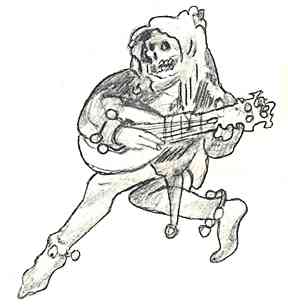
THE HISTORY OF THE DIGA RHYTHM BAND
In 1968 Mickey Hart was studying at the Ali Akbar College of Music with Tabla Master Shankar Gosh. Mickey would work on compositions with Shankar which included Rhythmic Cycles of 4, 6, 16, 5 & 7 and take these teachings to Bill Kreutzmann. Mickey and Bill were instructing Shankar on traps in exchange for Tabla lessons and would combine their knowledge in compositions of East and West.
In September of 1968 the Grateful Dead played a concert at Berkeley Community Theater. Before the concert the drummers had planned a surprise for the audience. During part of "Alligator", the G. D. amps rolled apart and two risers rolled on stage between Mickey and Bill. On them were Shankar Gosh and Vince Delgado, a fine dumbec player and a student of Shankar's. The four men sat and fixed compositions together, taking a rhythmic journey through many "Tals" or time cycles. Ali Akbar Kahn composed the closing composition for them and when they were finished, the applause was deafening. Shankar left Ali Akbar College in 1969 and returned to India, at this time Mickey also left to pursue electronic music.
In 1970 Mickey was introduced to Zakir Hussain, son of Mickey's mentor, Alla Rahka. Mickey met Alla Rahka in 1967 and had given himself over to the teachings of Indian rhythms during their first meeting. He subsequently became Shankar's student in California. Zakir had come from India to replace Shankar as Ali Akbar's personal drummer as Tabla instructor for the school. Quite a job for a man of 21, but Zakir had been studying since 8 years of age, he came well prepared.
In 1971 Zakir began to select some of his advance students for a school orchestra of only rhythm instruments. This was called Tal Vadyum Rhythm Band and they performed once a quarter at the Ali Akbar Kahn Collect of Music. This was the beginning of the Diga Band. In April, 1975 the Jefferson Starship asked them to play a concert with them and the Sons of Champlin. The band decided to play and also to change their name for public performance. The name chosen was Diga Rhythm Band. The concerts at Winterland in San Francisco on May 16 & 17, 1975 were successful, Alla Rahka was there both nights and was very pleased. Bill Graham was elated and the musicians from the other groups were very receptive to the music.
Diga is currently recording an album for Round Records, to be distributed by United Artists, in April. The band also plans to tour maybe in the Spring of '76.
DIG IT
| Jordan Aramantha | Congas |
| Peter Carmichael | Tablas |
| Aushim Chaudhuri | Tablas |
| Tor Dietrichson | Tablas |
| Vince Delgado | Dumbec and Tablas |
| Mickey Hart | Traps and Gongs |
| Zakir Hussain | Tablas and Folk Drums |
| Jim Loveless | Marimbas |
| Joy Shulman | Tablas |
| Ray Spiegel | Vibes |
| Arshad Syed | Duggi Tarang Ang Folk Drums |
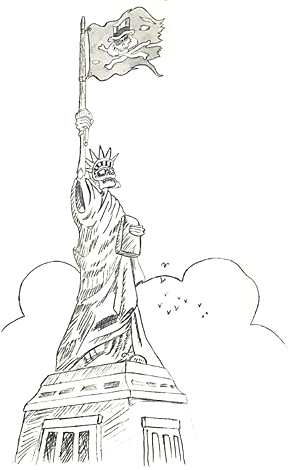
When I first appeared around, the chaps known as the Grateful Dead (for some strange reason they did and still do call themselves Bozo's), I was always impressed by how hard they worked at their performances, records, and now their most interesting movie and how close they feel to you folks, their "DeadHeads". It's really a source of great pride for me to have the Grateful Dead be part of my world.
Thank you.
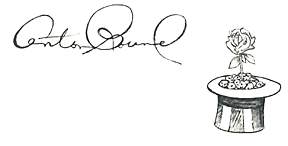
P. S. Don't just sit there, popularize and proselytize!
[Archives] [Deadfile] [Deadnet]